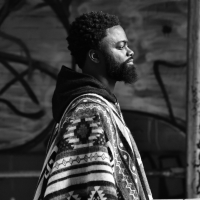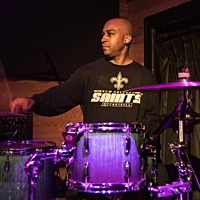Home » Jazz Articles » Radio & Podcasts » Samora Pinderhughes And Jack Deboe: Patience Is Extremely Freeing
Samora Pinderhughes And Jack Deboe: Patience Is Extremely Freeing
Click the play button to listen
Despite their long standing collaborative relationship, composer, pianist, vocalist, filmmaker, and multidisciplinary artist Samora Pinderhughes and drummer/producer Jack Deboe had never done an interview together before.Samora's music has a certain gravity to it. It deals with weighty, often difficult themes: incarceration, mental health, structural violence. His work asks us to reckon with uncomfortable truths about our world, and it does so with a sense of purpose and intention. But in person, Samora is funny, lighthearted, and full of life—a reminder that to laugh is not a dismissal of hardship, but a reclamation of power and presence in the face of it.
Samora and Jack's relationship is built on trust and experimentation, and their creative dynamic is as playful as it is profound. Over the years, they have worked together on multiple projects, including Samora's recent album Venus Smiles Not in the House of Tears and The Healing Project, a multidisciplinary initiative that combines music, visual art, and storytelling to address the far-reaching impact of the carceral system.
Samora's commitment to social justice is not something he stumbled upon by accident. It was instilled in him from an early age. Both of his parents have spent their lives doing transformative work in communities affected by violence and incarceration. His father focused on youth violence prevention and his mother taught in prisons. That upbringing shaped Samora's perspective and, eventually, his work as an artist. But it wasn't until he met and worked with theater artist Anna Deavere Smith that he began to understand how to take his ideas and transform them into something bigger, something multimedia and multifaceted. Anna encouraged him to look beyond the typical constraints of music-making and storytelling, and in doing so, helped inspire the expansive vision of The Healing Project.
The Healing Project is not only about people who are currently incarcerated. It's about the ripple effect that incarceration has on families, communities, and individuals—those who experience structural violence, displacement, and trauma in all its forms. For Samora, the work is as much about listening as it is about creating. He conducted hundreds of interviews with people who have been affected by the carceral system, and those stories became the foundation for the music, visual art, and performances that make up the project.
Presenting material like this in a way that invites people in without overwhelming them has been one of Samora's biggest challenges, and requires a lot of patience. These are slow moving, deliberative projects that require introspection and consideration. "Patience is the hardest part, but for me it's extremely freeing. It was my natural state but I never knew that until I was given the opportunity to investigate that through this project," says Pinderhughes.
At the same time, for Jack and Samora the creative process begins playfully and spontaneously. In contrast to the deeply intentional and patient nature of the Healing Project, Samora and Jack's album Venus Smiles Not in the House of Tears had its own organic, exploratory process.
Jack describes their early days of collaborating as playful and free, two friends sitting in a room with a keyboard, some percussion instruments, and a willingness to try anything. Jack explains, "I always try to remind myself that there's a reason they call it playing music. Let's go in the studio and play. So I like to put things in front of Samora that he has no experience with and say, 'Try this out.' And that's where discovery happens—when you feel like a kid again."
That spirit of openness led to a body of music that grapples with themes of mental health and societal pressure, and Pinderhughes sees the work as an effort to bridge the personal and collective aspects of that issue. "I think a lot of times when we talk about mental health, we talk about it in a very individualized, private way, on public platforms [... ] we don't talk about the experience of living that out in public, but we talk about it very publicly," he says.
The dialog between public and personal experiences, the collective and the individual, seems to be at the heart of Samora's thinking which may help to explain why he is equally at ease talking about his own struggles as he is about larger structural questions. To live a successful creative life, he says, is not only to do meaningful work, but also to live sustainably and healthily.
"Too often, we romanticize struggle, as though suffering is the price of creating something beautiful," he argues. "And I just think we have to believe as artists—and as people, really—that we can achieve the things we want while also having a certain quality of life. Not only because everyone deserves that, but also because if we take that as a non-negotiable, we won't accept being mistreated in the way we often have been."
Here are serious artists making serious work, but doing so with a lightness and playfulness that is infectious. It's a reminder that art, even when it confronts the heaviest of themes, can still be a source of joy. A sprawling, lively conversation about music and justice, art and life, struggle and joy, and the power of collaboration to transform not just the work, but the people who make it.
Tags
PREVIOUS / NEXT
Samora Pinderhughes Concerts
Support All About Jazz
 All About Jazz has been a pillar of jazz since 1995, championing it as an art form and, more importantly, supporting the musicians who make it. Our enduring commitment has made "AAJ" one of the most culturally important websites of its kind, read by hundreds of thousands of fans, musicians and industry figures every month.
All About Jazz has been a pillar of jazz since 1995, championing it as an art form and, more importantly, supporting the musicians who make it. Our enduring commitment has made "AAJ" one of the most culturally important websites of its kind, read by hundreds of thousands of fans, musicians and industry figures every month.

























